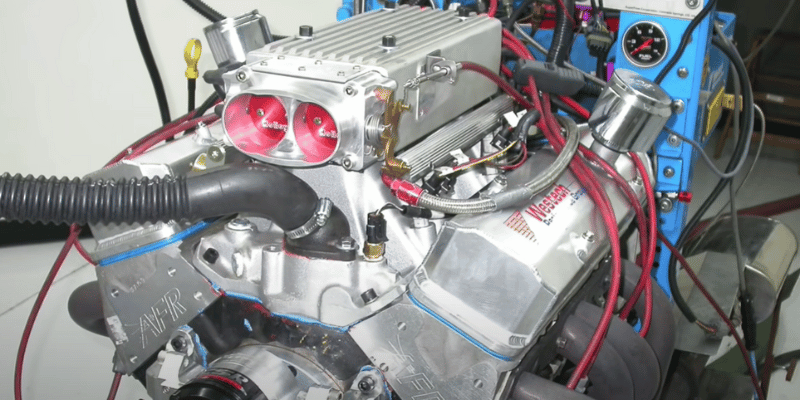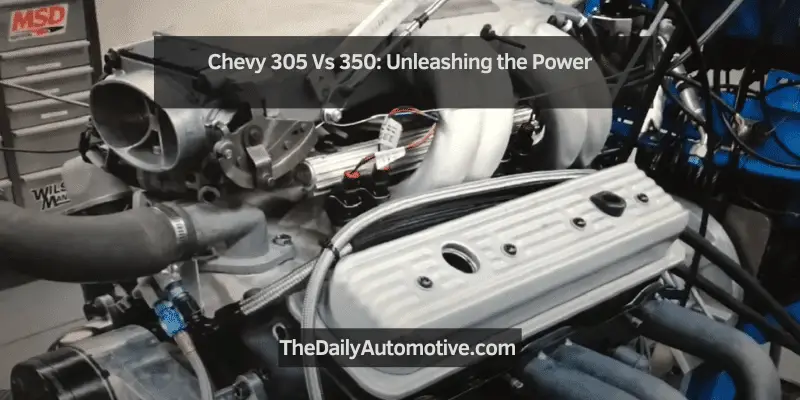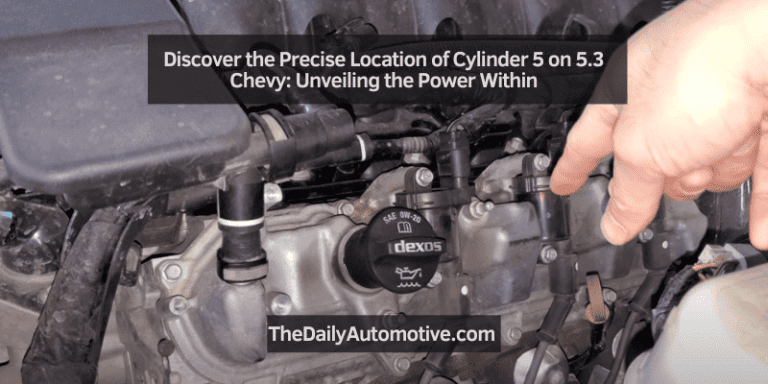Chevy 305 Vs 350: Unleashing the Power
The Chevy 305 and 350 engines are popular choices in the automotive world due to their differences in size and performance capabilities. The Chevy 305 is a smaller engine that offers good fuel efficiency and is often found in smaller vehicles.
On the other hand, the Chevy 350 is a larger engine known for its power and performance, making it a popular choice for muscle cars and trucks. Both engines have their own advantages and disadvantages, so the decision between the two ultimately depends on the specific needs and preferences of the vehicle owner.
Factors such as desired power, fuel efficiency, and budget will play a role in determining which engine is the better choice. In the following article, we will explore the key differences between the Chevy 305 and 350 engines, allowing you to make an informed decision about which engine is right for your vehicle.
Exploring The Specifications And Features
Explore the powerful specs and features of the Chevy 305 and 350 engines for an exhilarating driving experience. Uncover the key distinctions between these two engines to make an informed decision for your vehicle needs.
Overview Of The Chevy 305 Engine
When it comes to comparing the Chevy 305 and 350 engines, it’s essential to delve into their specifications and features to make an informed decision. Let’s explore these two powerhouses and understand what sets them apart.
Key Performance Factors Of The Chevy 305
The Chevy 305 engine offers impressive performance factors that make it a popular choice among car enthusiasts. Here are the key points to consider:
- Displacement: The Chevy 305 has a displacement of 5.0l, which means it can move a significant volume of air and fuel mixture with each revolution.
- Compression ratio: This engine typically boasts a compression ratio of 9.5:1, allowing for efficient combustion and power generation.
- Horsepower: The average horsepower of the Chevy 305 ranges from 130 to 240, depending on the specific model and modifications.
- Torque: With a torque output ranging from 240 to 300 lb-ft, the Chevy 305 provides impressive low-end power and acceleration.
Comparing Power Output And Torque
Power output and torque are crucial considerations when choosing between the Chevy 305 and 350 engines. Here’s how they stack up:
- Power output: The Chevy 305 engine offers adequate power for various applications. It provides sufficient horsepower to meet the needs of most drivers, ensuring a smooth and enjoyable driving experience.
- Torque: While the Chevy 305 doesn’t boast the highest torque figures, it offers sufficient low-end torque for efficient acceleration, making it suitable for daily driving and moderate towing requirements.
Examining Fuel Efficiency And Economy
When it comes to fuel efficiency and economy, the Chevy 305 engine holds its ground. Here’s what you need to know:
- Fuel efficiency: The Chevy 305 strikes a good balance between power and fuel efficiency. Its moderate displacement allows for a decent fuel economy, making it a viable option for those conscious of their wallet and the environment.
- Economy: The Chevy 305’s economy is influenced by factors such as driving style, vehicle weight, and maintenance. With proper care and usage, this engine can provide satisfactory fuel economy, ensuring your adventures don’t break the bank.
The Chevy 305 engine offers respectable specifications and features that suit the needs of most drivers. It provides ample power, torque, and fuel efficiency for an enjoyable driving experience. Whether you’re looking for a reliable daily driver or a vehicle capable of moderate towing, the Chevy 305 is worth considering.
Understanding The Anatomy Of The Chevy 350 Engine
Discovering the inner workings of the Chevy 350 engine helps shed light on the differences between the Chevy 305 and the 350. Uncover the distinct characteristics and capabilities of these two engines to make an informed decision for your vehicle.
The Chevy 350 engine, also known as the “small-block” v8 engine, is a legendary powerhouse in the automotive world. With its rich heritage and enduring popularity, it’s essential to understand the key aspects that make this engine so special. Let’s delve into the anatomy of the Chevy 350 engine and explore its performance characteristics, power and torque delivery, as well as its fuel efficiency and practicality.
Overview Of The Chevy 350 Engine:
- The Chevy 350 engine is a versatile and durable small-block v8 engine that has been in production since 1967.
- It is renowned for its compact design, making it suitable for a wide range of applications, from muscle cars to trucks.
- With a displacement of 5.7 liters (or 350 cubic inches), this engine packs a punch without sacrificing efficiency.
- The Chevy 350 engine features a cast-iron block and cylinder heads, ensuring robustness and heat dissipation.
- It has a simple and reliable design, making maintenance and repairs generally straightforward.
- Over the years, the Chevy 350 engine has undergone various updates and improvements to enhance performance and meet evolving emission standards.
Analyzing Key Performance Characteristics:
- The Chevy 350 engine offers impressive horsepower and torque output, contributing to its exceptional performance.
- It delivers a balance between power and efficiency, making it suitable for both daily driving and high-performance applications.
- With proper modifications and upgrades, this engine can produce significant power gains, satisfying performance enthusiasts.
- The Chevy 350 engine is known for its strong low-end torque, providing quick acceleration and responsiveness.
- Its overhead valve design and large displacement contribute to smoother operation and a satisfyingly muscular sound.
Comparing Power And Torque Delivery:
- The Chevy 350 engine offers a wide power band, delivering ample torque throughout the rev range.
- It excels in off-the-line acceleration, making it ideal for stop-and-go driving and towing applications.
- The torque curve of the Chevy 350 engine ensures usable power at lower rpms, providing a responsive driving experience.
- Due to its design and components, this engine can handle increased power output with ease, making it a popular choice for performance upgrades.
Weighing Fuel Efficiency And Practicality:
- Despite its impressive performance capabilities, the Chevy 350 engine remains relatively fuel-efficient.
- Its smaller displacement, compared to larger v8 engines, contributes to improved fuel economy.
- The Chevy 350 engine is known for its durability and longevity, with many examples still running strong after decades of use.
- It offers ample torque and power for hauling and towing, making it a practical choice for work vehicles and heavy-duty applications.
The Chevy 350 engine stands as a testament to its enduring legacy and outstanding performance characteristics. Its compact design, impressive power delivery, and practicality make it a true automotive icon. Whether you’re seeking reliable daily transportation or exhilarating performance, the Chevy 350 engine has the versatility to meet your needs.
Performance And Power Output
Comparing the performance and power output between the Chevy 305 and Chevy 350 engines reveals distinct differences. The Chevy 350 offers greater power with its larger displacement, delivering increased horsepower and torque for enhanced performance on the road. On the other hand, the Chevy 305 provides a more fuel-efficient option without compromising on decent power output.
Chevrolet has long been known for producing powerful engines that deliver impressive performance. When it comes to the Chevy 305 vs. 350 battle, performance, and power output are key factors to consider. Let’s dive into the details and compare these two engines side by side.
Comparing Horsepower And Torque Figures:
- Chevy 305: The 305 cubic inch engine was introduced by Chevrolet in 1976. It features a bore of 3.736 inches and a stroke of 3.480 inches. The output of the 305 engine varies depending on the model year, but it typically ranges from 130 to 230 horsepower and around 240 to 290 lb-ft of torque.
- Chevy 350: The legendary 350 cubic inch engine has been a staple in the Chevy lineup for decades. With a bore size of 4,000 inches and a stroke of 3.480 inches, the 350 engine offers more power compared to the 305. Horsepower for the 350 engine can range from 160 to 370, with torque figures ranging from 250 to 400 lb-ft.
Analyzing Acceleration And Top Speed:
- Chevy 305: Due to its lower power output, the 305 engine may not deliver the same level of acceleration as the 350. However, it can still provide decent performance for everyday driving. The top speed achievable with a Chevy 305 may vary based on other factors, such as vehicle weight and aerodynamics.
- Chevy 350: Thanks to its higher power output, the 350 engine can offer better acceleration compared to the 305. It can propel your vehicle from a standstill to higher speeds more swiftly, making it ideal for those seeking exhilarating driving experiences. The top speed attainable with a Chevy 350 will also depend on various factors, including gear ratios and aerodynamics.
Evaluating Power-To-Weight Ratio:
- Chevy 305: The power-to-weight ratio of the 305 engine will depend on the vehicle it is installed in. However, due to its lower power output, it may not provide the same level of performance as the 350 engine in heavier vehicles.
- Chevy 350: With its higher power output, the 350 engine delivers a superior power-to-weight ratio compared to the 305. This means that vehicles with the 350 engine installed can achieve better acceleration and performance, especially when paired with a lightweight body.
While the Chevy 305 has its merits and can offer satisfactory performance for everyday driving, the 350 engine stands out with its greater power output and superior performance capabilities. Whether you’re looking for exhilarating acceleration or the ability to reach higher top speeds, the Chevy 350 is the clear winner in the battle between the Chevy 305 vs 350.
Reliability And Durability
Chevy 305 and 350 engines are known for their reliability and durability. These powerhouse engines offer long-lasting performance, making them dependable options for any vehicle.
Examining Longevity And Maintenance Needs:
Chevy 305:
- This engine is known for its durability and reliability, making it a popular choice for both daily drivers and performance enthusiasts.
- With proper maintenance and care, the Chevy 305 can last well over 200,000 miles.
- Regular oil changes, tune-ups, and inspections are recommended to keep the engine running smoothly.
- Replacement parts for the Chevy 305 are widely available and affordable, making repairs relatively easy and cost-effective.
Chevy 350:
- The Chevy 350 has a reputation for exceptional longevity and reliability.
- This engine is known to withstand high mileage and can often surpass 300,000 miles with proper maintenance.
- Regular oil changes, tune-ups, and inspections are essential for ensuring the longevity of the Chevy 350.
- Replacement parts for the Chevy 350 are readily available and reasonably priced, making repairs more accessible.
Analyzing Engine Construction And Quality:
Chevy 305:
- The Chevy 305 features good-quality construction with a cast-iron block and cylinder heads, ensuring durability.
- Although it has a smaller displacement compared to the Chevy 350, the Chevy 305’s compact design allows for easier fitment in various vehicles.
- The engine’s overall design and construction make it a reliable choice, providing consistent performance.
Chevy 350:
- The Chevy 350 is renowned for its robust construction and high-quality components, ensuring longevity and durability.
- It features a cast-iron block and cylinder heads, providing exceptional strength and heat dissipation.
- The larger displacement of the Chevy 350 allows for more power and torque, making it suitable for various applications.
- This engine’s construction and quality contribute to its reputation as a reliable and long-lasting choice.
Weighing The Potential For Modifications:
Chevy 305:
- The Chevy 305 offers some potential for modifications, allowing enthusiasts to enhance its performance.
- Upgrades such as intake and exhaust improvements, performance camshafts, and aftermarket ignition systems can provide noticeable power gains.
- However, the limited aftermarket support for the Chevy 305 compared to the Chevy 350 may restrict the extent of modifications available.
Chevy 350:
- The Chevy 350 is highly regarded for its extensive aftermarket support, providing ample options for modifications.
- Enthusiasts can choose from a wide range of upgrades, including high-performance intake and exhaust systems, camshafts, and cylinder heads.
- The Chevy 350’s versatility makes it a popular choice for performance enthusiasts seeking to achieve substantial power gains.
- With the right modifications, the Chevy 350 can transform into a potent and formidable engine.
That wraps up our examination of the reliability and durability of the Chevy 305 and Chevy 350 engines. Both options offer notable qualities, but their slight differences in longevity, construction, and modification potential can help you make an informed decision based on your specific needs and preferences.
Remember to consider maintenance requirements when choosing an engine, as proper care plays a vital role in their overall performance and longevity.
Fuel Efficiency And Economy
The Chevy 305 and 350 engines offer varying levels of fuel efficiency and economy. Drivers can expect differences in terms of power and performance, with the 305 offering a balance between fuel economy and performance, while the 350 provides more power at the expense of fuel efficiency.
Choose the engine that suits your specific needs and driving preferences.
Comparing Fuel Consumption Rates
When it comes to choosing between the Chevy 305 and 350 engines, fuel efficiency plays a significant role in decision-making. Understanding and comparing the fuel consumption rates of these engines can help you determine which one is more economical for your needs.
Let’s dive into the details and examine the fuel efficiency and economy of the Chevy 305 and 350 engines.
- The Chevy 305 engine offers decent fuel economy with a moderate power output.
- With its smaller displacement, the 305 engine tends to consume less fuel compared to the 350 engine in certain driving scenarios.
- On the other hand, the Chevy 350 engine is known for its power and performance, but it may consume more fuel than the 305 engine.
Analyzing Efficiency In Different Driving Scenarios
To better understand the fuel efficiency and economy of the Chevy 305 and 350 engines, let’s look at how they perform in different driving scenarios:
City driving:
The Chevy 305 engine is efficient for city driving due to its smaller displacement and lower power output.
Its moderate fuel consumption ensures you can navigate the urban landscape without breaking the bank.
The 350 engine, while powerful, may consume more fuel in stop-and-go traffic situations.
Highway cruising:
- When cruising on the highway, the Chevy 350 engine’s larger displacement and higher power output shine.
- Its ability to maintain speed effortlessly may result in a slightly higher fuel consumption compared to the 305 engine.
- However, the difference is often marginal, and both engines can provide a satisfactory fuel economy for long highway drives.
Evaluating The Cost Of Ownership
Apart from fuel consumption, it’s essential to evaluate the overall cost of ownership when considering the Chevy 305 and 350 engines. Here are a few factors to consider:
- Initial cost: The Chevy 305 engine is generally more affordable than the 350 engine, which means lower upfront expenses.
- Maintenance: The 305 engine, being simpler in design, may require less maintenance, translating into potential cost savings in the long run.
- Availability of parts: The Chevy 350 engine has been a popular choice for many enthusiasts, resulting in greater availability of aftermarket parts, which may influence maintenance costs.
The Chevy 305 and 350 engines have their own strengths when it comes to fuel efficiency and economy. While the 305 engine can provide decent fuel economy for city driving, the 350 engine’s power output may come at the cost of slightly higher fuel consumption.
Consider your driving preferences, budget, and long-term ownership costs to decide which engine is the best fit for you.
Identifying Your Performance Needs
Choosing between the Chevy 305 and 350 boils down to your specific performance needs. Assessing factors like power, torque, and budget will help you decide which engine is the perfect fit for your vehicle.
Assessing Daily Driving And Usage
- Are you planning to use your Chevy as a daily driver or more casually on weekends and special occasions?
- How far do you typically drive each day?
- Do you anticipate hauling heavy loads or towing frequently?
- Are fuel efficiency and overall cost of ownership primary considerations?
These questions will help you understand your specific requirements and inform your decision between a Chevy 305 or 350 engine.
Determining Performance Goals And Priorities
- Are you looking for a more powerful engine that delivers exceptional acceleration and performance?
- Is top speed a priority for you?
- Do you desire a smoother, quieter driving experience?
- Are you seeking improved fuel efficiency without compromising on power?
Clearly defining your performance goals and priorities will enable you to select the best option between the Chevy 305 and 350 engines.
Considering Future Modifications
- Are you planning to make any modifications to your Chevy in the future?
- Do you have aspirations for enhancing horsepower and torque?
- Would you like the flexibility to modify your engine for racing or other high-performance applications?
- Are you interested in the availability and cost-effectiveness of aftermarket parts and accessories?
Considering potential future modifications is crucial when deciding between the Chevy 305 and 350 engines, as it can impact long-term performance and customization possibilities.
By assessing your daily driving and usage, determining your performance goals and priorities, and considering future modifications, you can make an informed decision between the Chevy 305 and 350 engines. Understanding your specific needs will ensure that you choose an engine that perfectly fits your requirements.
So, let’s dive deeper and explore each engine’s specifications and features to help you make the right choice for your Chevy.

Budget And Cost Considerations
Comparing budget and cost considerations between the Chevy 305 and 350 engines reveals important factors for buyers. Understanding the price differences can help in making an informed decision based on individual requirements and financial constraints.
Chevy 305 Vs 350: Budget And Cost Considerations
Are you considering upgrading your Chevy engine but unsure whether to choose the 305 or the 350? Budget and cost considerations play a vital role in making the right decision. In this section, we will weigh the initial investment, evaluate long-term costs and maintenance, and determine the overall value for money.
Weighing The Initial Investment
When it comes to the initial investment, it’s essential to assess the cost of both the chevy 305 and the 350. Here’s what you need to know:
Chevy 305:
- Typically less expensive upfront compared to the 350.
- Affordable options are available, making it an attractive choice for those on a tight budget.
- Can be a cost-effective option for minor upgrades or project builds.
Chevy 350:
- Slightly higher initial cost due to its popularity and wider availability.
- Additional performance options and aftermarket parts may increase the overall investment.
- Considered a reliable and versatile engine, making it worth the extra expense for enthusiasts seeking more power and performance.
Evaluating Long-Term Costs And Maintenance
It’s not just about the initial investment; long-term costs and maintenance are crucial factors to consider. Here’s an evaluation of each engine’s long-term aspects:
Chevy 305:
- May require less maintenance compared to the 350.
- Can provide decent fuel efficiency, potentially saving money on gas over time.
- Availability of replacement parts and affordability contribute to lower long-term costs.
- Suitable for daily driving or casual use without demanding high maintenance or repair expenses.
Chevy 350:
- Some variations might require more frequent maintenance and upkeep due to higher performance capabilities.
- Potentially higher fuel consumption compared to the 305, resulting in increased long-term costs.
- Beneficial for performance enthusiasts willing to invest more in regular maintenance to maximize power and longevity.
- The availability of aftermarket parts and established support enhances long-term value.
Determining Value For Money
When it comes to determining value for money, both the initial investment and long-term costs need to be considered. Here’s what to keep in mind:
Chevy 305:
- Ideal for those seeking an affordable upgrade or replacement without compromising functionality.
- Provides decent performance at a lower price point.
- Offers good value for money for those with limited budgets or non-performance-oriented needs.
Chevy 350:
- Offers a higher level of power and performance potential, justifying the higher initial investment and long-term costs for enthusiasts.
- Provides excellent value for money for individuals looking for enhanced performance and reliability over the long run.
Ultimately, the choice between the Chevy 305 and the 350 depends on your specific needs, budget, and priorities. Consider your goals, available funds, and long-term expectations to make an informed decision that aligns with your requirements.
Upgrade your Chevy engine wisely and enjoy a thrilling and satisfying driving experience suited to your preferences and budget.
Application And Intended Use
The Chevy 305 and 350 engines have different uses and applications. While the 305 is often seen in smaller vehicles for fuel efficiency, the 350 is favored for its increased power and performance in larger, heavier vehicles or applications requiring more muscle.
Chevy 305 vs. 350: analyzing the engine’s suitability for different vehicles
When it comes to choosing between the Chevy 305 and the Chevy 350, understanding their application and intended use is crucial. Each engine has its strengths and is better suited for specific purposes. Let’s delve into the factors that can help you determine which engine is the right fit for your vehicle.
Analyzing The Engine’s Suitability For Different Vehicles:
• Chevy 305:
- Ideal for light-duty applications and smaller vehicles like sedans and compact trucks.
- Offers lower power output compared to the 350, but provides better fuel efficiency.
- Suitable for daily commuting, errands, and occasional hauling with lighter loads.
- Smoother idle and quieter operation, making it a good choice for those seeking a comfortable driving experience.
• Chevy 350:
- Perfect for heavy-duty applications and larger vehicles such as suvs, muscle cars, and full-size trucks.
- Delivers impressive power, torque, and acceleration, making it suitable for towing, off-roading, and high-performance driving.
- Has a larger displacement, allowing it to handle heavier loads and provide more robust performance.
- Offers a wider range of aftermarket performance parts and upgrades, giving enthusiasts the ability to customize their vehicles to their liking.
Considering Environmental Factors And Regulations:
• Chevy 305:
- With its better fuel efficiency, the 305 engine tends to have lower emissions than the 350.
- Compliance with stricter emission regulations and fuel economy standards is easier with the 305.
- Suitable for areas where emission regulations are stringent or where fuel economy is a significant concern.
• Chevy 350:
- Due to its higher power output and larger displacement, the 350 engine may produce more emissions compared to the 305.
- Compliance with emission regulations and fuel economy standards can be more challenging with the 350.
- Suitable for areas with less strict emission regulations or for those who prioritize power and performance over fuel efficiency.
Understanding The Impact On Vehicle Resale Value:
• Chevy 305:
- Vehicles equipped with the 305 engine generally have a lower resale value compared to those with the 350.
- Lower demand for vehicles with the 305 may affect their resale marketability.
- Can be a cost-effective option for those on a tighter budget or who do not plan to sell their vehicle in the near future.
• Chevy 350:
- Vehicles powered by the 350 engine tend to have a higher resale value due to their reputation for power and performance.
- The popularity of the 350 may make these vehicles more sought after in the used car market.
- Can be a favorable choice for those looking for a vehicle that retains its value well and may be sold in the future.
Both the Chevy 305 and 350 have their unique characteristics and applications. By considering factors such as intended use, environmental regulations, and resale value, you can make an informed decision on which engine is best suited for your vehicle. Whether it’s the fuel-efficient and lighter-duty 305 or the powerful and versatile 350, choosing the right engine will ensure optimal performance and satisfaction for your driving needs.
Frequently Asked Questions Of Chevy 305 Vs 350
What Is The Difference Between A 305 And A 350?
The main difference between a 305 and a 350 is their engine displacement. A 305 has a smaller engine size of 305 cubic inches, while a 350 has a larger engine size of 350 cubic inches. This means that the 350 has a larger engine capacity, resulting in potentially higher horsepower and torque output.
The difference in engine size can impact the performance and power of the vehicle. Additionally, the 350 may have more available aftermarket parts and upgrades due to its popularity among car enthusiasts. It is essential to consider your specific needs and preferences when choosing between a 305 and a 350, as well as the compatibility with your vehicle and any modifications you may have in mind.
Are Chevy 305 Engines Good?
Chevy 305 engines are a reliable and popular choice among car enthusiasts. They offer a good balance of power and efficiency. The 305 engine is known for its durability and strong performance. It is commonly used in small-block v8 applications and has been a staple in the Chevy lineup for many years.
With proper maintenance, the Chevy 305 engine can provide dependable performance and last for a long time. Its availability of parts and relatively easy maintenance make it a good option for those looking for a dependable and capable engine. Overall, the Chevy 305 engine is considered to be a good choice for a variety of applications.
How Much HP Can A Chevy 305 Make?
A Chevy 305 can make around 150 to 250 horsepower, depending on the type of modifications made.
Can I Swap A 305 For A 350?
Yes, you can swap a 305 engine for a 350 engine.
Conclusion
The comparison between the Chevy 305 and 350 engines shows that both have their strengths and weaknesses. The Chevy 305, with its smaller displacement, offers better fuel efficiency and generates less heat, making it a suitable choice for daily driving and lighter vehicles.
On the other hand, the Chevy 350, with its larger displacement, provides more power and torque, making it better suited for heavy vehicles and towing applications. If you prioritize performance and don’t mind the slightly lower fuel efficiency, the Chevy 350 is the better option.
However, if fuel economy and smooth daily driving are of utmost importance, the Chevy 305 will suit your needs. Ultimately, the decision between these two engines depends on your specific requirements and preferences. Whichever you choose, be sure to consider factors such as vehicle weight, intended use, and budget.







